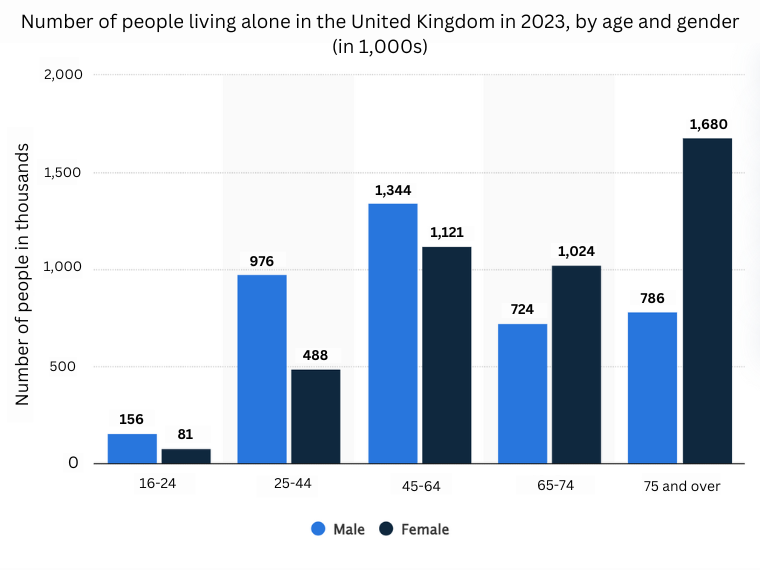You’ve Planned Your Holiday… What About Your Retirement?
We all do it — spend hours searching for the best hotel deals, checking out flights, and daydreaming about poolside…


Not everyone is married, has a partner, or has children. Some people end up alone in retirement due to losing a spouse, getting divorced, never marrying, or choosing not to have kids. This is becoming more common nowadays.
In fact, according to Statista, in 2023 there were approximately 1.68 million women aged 75 and over who were living alone in the United Kingdom. That’s compared to 786,000 men in the same age group.

These figures really highlight why women need to make retirement planning a priority. Reason being, you may have smaller pension pots due to being out of work raising children or simply earning less as a result of the gender pay gap.
Retiring without a partner or children may feel lonely and frightening to some people, but for others, it means enjoying the freedom of independence. In this situation, you get to make decisions for yourself, travel whenever and wherever you want, and have fewer financial worries.
Single retirees are also likely to have fewer financial burdens along the way and are able to build a bigger nest egg. Even though you may not have a partner to share household expenses, a solid middle-class income can support a single person comfortably.
Non-parents are also able to save without the expense of raising a child or paying for university tuition.
The first step to retiring single is making sure you have enough money to cover your living expenses. And the sooner you begin saving and investing, the better.
You should also have substantial emergency savings set aside. Major expenses can pop up at any time and if you’re on a fixed income, not prepared, or unable to ask family for help, you can find yourself in a challenging predicament.
Retirement planning is more than just crunching numbers, it’s imagining what your life could be.
Think about the activities or hobbies that you enjoy the most. Create a bucket list and check off as much as you can. Take a class, volunteer, adopt a pet, get involved in your community, travel, or whatever you’d like really. You’ll finally have the time to do many of the things you always wanted to do. And, you’ll have more flexibility than retirees who have more family commitments.
As a singleton, you can also lower your expenses and consider spending out your days in the sunshine or foreign shores, the world really is your oyster!
And, if that freedom isn’t enough, there’s also a stark reality to consider. Older people who feel they’ve lost their purpose in life are more prone to faster declines in mental and/or physical health. So, wouldn’t you rather fill your diary with feel good activities, not doctor’s appointments?
As you get older, you need to surround yourself with a support system. While this may be a bit harder for some independent singles, it’s important that you have people that are there for you when you need them, and likewise, you’re there for them too.
Knowing you have a mix of friends, family, co-workers and acquaintances looking out for you, can help give you reassurance that you’re not alone.
Retiring as a single person will require that you cover the costs for your basic physical needs for longer than someone who has stronger family support. If health problems arise, hiring help can prove very costly.
So, if something doesn’t feel right, don’t brush it off. You need to catch major issues as soon as you can. You should also focus on self-care to ensure that you can keep your independence as long as possible.
If you don’t have disability insurance in place from your employer, this is one to look into. While these can come at a cost, they will be more important to you as a single person than life insurance. You only have your own income to rely on and the possibility of developing a disability in later life is not that uncommon.
Retiring as a single person will require that you cover the costs for your basic physical needs for longer than someone who has stronger family support. If health problems arise, hiring help can prove very costly.
Typically, families have conversations about where their mum and dad are going to live but single pensioners get to decide for themselves.
You can choose when and where you move, including the type of accommodations. You can choose to move into a 55+ community, retirement home, a co-housing development for pensioners, or share a house with a friend or roommates, there are more options available than you might think.
As time goes on, though, you might need extra help, and it’s important to think about the potential costs of care when planning your future living arrangements. With care fees going up, having a financial plan that includes future care costs ensures that you can maintain a comfortable and secure lifestyle as your needs change and evolve.
Many people realise too late how important it is to have the right paperwork to protect their home, pensions, and savings from care fees. At Joslin Rhodes, our Estate Planning team is here to help with all the necessary documents, so you don’t have to worry about it.
When you’re single, there isn’t always one person with a legal or moral obligation to look out for your best interests.
You need to consider who is the best person in your life currently to carry out health care and financial decisions in the event that you become incapacitated. But, don’t just name them. You need to have the conversation to ensure they are on board and willing to take on the responsibility. This can be a big ask for some, so don’t take offense if they are unable to commit.
You should also have backups in place, and note that a professional, such as your primary care physician, attorney, or financial professional could be assigned some of the responsibility.
Whether you’re planning to be someone’s rich uncle or aunty who leaves them with a sizable inheritance, or you’ll have just enough to cover your debts and burial expenses, it’s important to handle your estate planning early and review and update it regularly. No matter the amount of assets you hold, your affairs will need to be settled and closed out.
Even if you don’t have a close family member or friend to leave an inheritance to, you probably have a cause or charity that you’d like to support with a donation, rather than letting the state absorb your assets or determine next of kin. You’ve worked hard for what you have; see to it that what you leave behind falls into the right hands.
With proper financial planning, single retirees can have it all. When you’re on your own, you might not realise the advantages of getting advice from professionals, or you might feel a bit unsure about it. This is completely normal. But reaching out to experts can really improve your financial situation. At Joslin Rhodes, our experts have been helping Teessiders plan happy retirements for over 20 years, and we can help you too. So, why not take the opportunity to shape your future? Take the first step by contacting us today.
Joslin Rhodes Pension & Retirement Planning – Real Advice, For Real People
Pop your details below to arrange a call with our local pension & retirement planning advisers

We all do it — spend hours searching for the best hotel deals, checking out flights, and daydreaming about poolside…